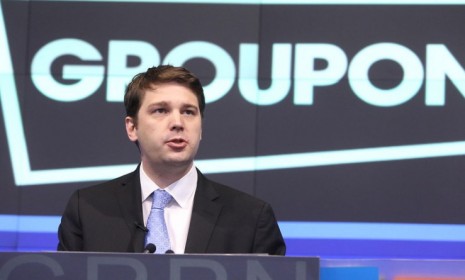Groupon's burst IPO bubble: 4 theories
When the daily deals company went public in early November, its share price soared. Now it's collapsed and investors are preparing for a crash landing

A free daily email with the biggest news stories of the day – and the best features from TheWeek.com
You are now subscribed
Your newsletter sign-up was successful
Since Groupon's "gangbusters" IPO earlier this month, the daily deals site has fallen — hard. The company's IPO price was $20 per share, and the stock quickly climbed to $31.14 in its first day of trading. Now, shares have fallen below their initial offer price, with shares trading around $17, down about 12 percent from Tuesday. Groupon's financial problems — the company is bleeding hundreds of millions of dollars — are hardly a secret. But why exactly has Groupon's share price fallen so far, so fast? Here, four theories:
1. Investors are worried about Groupon's competitors
Renewed concern over rivals like Living Social, which has Amazon's backing, have dragged Groupon down, says Douglas MacMillan at Bloomberg. Just this week, for instance, Living Social announced plans "to offer more than 20 deals with national merchants over the crucial Black Friday shopping period," says Edward Krudy at Reuters.
The Week
Escape your echo chamber. Get the facts behind the news, plus analysis from multiple perspectives.

Sign up for The Week's Free Newsletters
From our morning news briefing to a weekly Good News Newsletter, get the best of The Week delivered directly to your inbox.
From our morning news briefing to a weekly Good News Newsletter, get the best of The Week delivered directly to your inbox.
2. Investors are profiting by betting against Groupon
Traders are shorting Groupon's stock — essentially, making bets that pay off if the share price declines, analyst Herman Leung tells Bloomberg. The "borrow rate, or fee imposed by brokers on traders who want to sell short," has plummeted this month. That means more traders are selling short, which can have the effect of driving share prices down.
3. IPOs are down across the board
On average, IPOs are down 8 percent from their original offer price this year, Lynn Cowan noted earlier this month in The Wall Street Journal. While internet companies like LinkedIn and Groupon have seen big pops right after going public, in the end, they tend to suffer the same declines as non-internet IPOs. Simply put, these "highflying tech IPOs fall flat."
A free daily email with the biggest news stories of the day – and the best features from TheWeek.com
4. Groupon's small float invites volatility
"Remember that Groupon sold a small percentage of its total stock in its IPO, and a small float inevitably means a bumpy stock price," says Shira Ovide in The Wall Street Journal. "In Groupon's case, the volatility has gone mostly one way: Down."
-
 The EU’s war on fast fashion
The EU’s war on fast fashionIn the Spotlight Bloc launches investigation into Shein over sale of weapons and ‘childlike’ sex dolls, alongside efforts to tax e-commerce giants and combat textile waste
-
 How to Get to Heaven from Belfast: a ‘highly entertaining ride’
How to Get to Heaven from Belfast: a ‘highly entertaining ride’The Week Recommends Mystery-comedy from the creator of Derry Girls should be ‘your new binge-watch’
-
 The 8 best TV shows of the 1960s
The 8 best TV shows of the 1960sThe standout shows of this decade take viewers from outer space to the Wild West